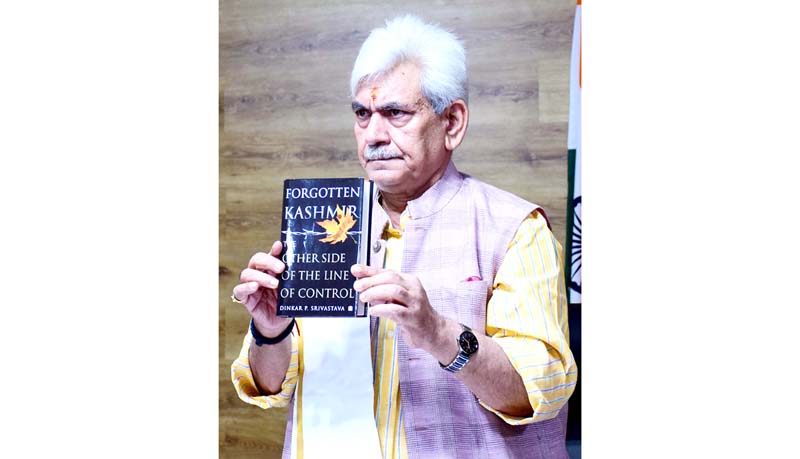‘UT witnessing wave of positive changes’
Excelsior Correspondent
JAMMU, Mar 18: Lieutenant Governor Manoj Sinha today said that for the last seven decades, Jammu and Kashmir has been kept away from prosperity and development despite getting more per capita budget than other States.
He said that since August 5, 2019, with the efforts and resolve of Prime Minister Narendra Modi, Jammu and Kashmir has been fully integrated into the mainstream of the nation.
“For the last seven decades, Jammu and Kashmir has been kept away from prosperity and development despite getting more per capita budget than other States,” the Lt Governor said while releasing a book titled ‘Forgotten Kashmir: The other side of the Line of Control’ authored by seasoned diplomat Dinkar P Srivastava.
Sinha said that now the development process in the Union Territory has been accelerated. Soon, the population living in 973 villages will be connected with paved roads for the first time after Independence, and remote villages will have electricity for 20-22 hours in the next three-four years.
Speaking on various reformative measures being taken for the development of the UT, the Lt Governor observed that Jammu and Kashmir is witnessing a wave of positive change since the last 18 months and a determined push is being given to socio-economic development.
“Hundreds of laws and policies hampering the development of the region have been done away with, or modified,” he added.
The Lt Governor also addressed a webinar of Vivekananda International Foundation on the occasion.
Sinha appreciated the author for “unmasking” Pakistan’s conspiracy and atrocities on the people of Pakistan-occupied Jammu & Kashmir (PoJK) over the past seven decades through his book, and creating a better understanding of Pakistan’s motivations for its policies in the region.
The Lt Governor commended the contributions of Dinkar P Srivastava, a seasoned diplomat, on foreign diplomacy front. He also made a special mention of the author for his involvement in the Jammu and Kashmir issue at the Ministry of External Affairs, and discussions in the United Nations.
Home Minister Amit Shah, on the floors of Parliament, has cleared India’s stand on PoJK. Indian Foreign Ministry has also warned Pakistan against any demographic change in the region, said the Lt Governor.
On the importance of empowered grassroot democratic setup, the Lt Governor said that the three-tier Panchayati Raj system was established and peaceful. Violence-free and fair elections were held for the District Development Councils for the first time in J&K.
The Lt Governor observed that the UT Government is nurturing transparency and accountability at all levels of the administration. Issues and development aspirations of the people living in rural areas are one of the focus areas of the government, he added.
Reforms have been made in making public grievance redressal mechanisms more robust and responsive. LG’s Mulaqaat- Live Public Grievance Hearing is being held every month, Sinha said.
The Lt Governor also addressed a webinar of Vivekananda International Foundation on the occasion.
He appreciated the author for unmasking Pakistan’s conspiracy and atrocities on the people of Pakistan-Occupied Jammu & Kashmir (PoJK) over the past seven decades through his book (released by him) and creating a better understanding of Pakistan’s motivations for its policies in the region.
The book is well researched and documented, based on facts and experience of the author, bringing into light various important aspects of ‘tribal’ invasion in 1947-48, the Sudhan revolt in the 1950s, the Ayub era, the Simla Agreement, the adoption of an ‘Interim Constitution of 1974’ and the China-Pakistan Economic Corridor (CPEC). The book also mentioned the Pakistani Army Officer who himself spoke about the evil designs of Pakistan, said the Lt Governor.
The Lt Governor commended the contributions of Dinkar P. Srivastava, who is a seasoned diplomat, on foreign diplomacy front. He also made a special mention of the author for his involvement in the Jammu and Kashmir issue at the Ministry of External Affairs, and discussions in the United Nations.


